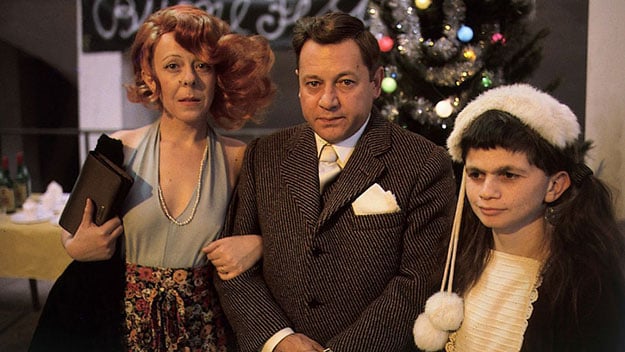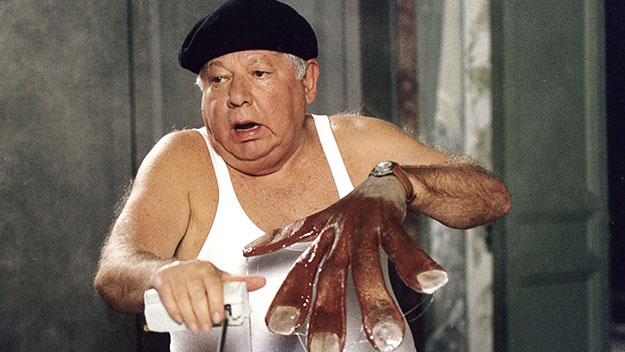In Memoriam: Paolo Villaggio

Fantozzi
Except for a few brief notices in the trades, the death of Italian actor Paolo Villaggio on July 3 went virtually unnoticed outside of his native country. In Italy, news of his passing sent shockwaves through the national conscious with a magnitude that is in itself revealing. An unofficial national day of mourning was observed with quasi-religious devotion in a country notoriously split on pretty much everything. Images of his face adorned the front pages of all national newspapers; heartfelt homages and teary farewells pervaded online media; literary magazines published erudite dissections of his cultural significance. And television schedules were suddenly filled with his films. Practically everyone spared a heartfelt moment for one of the most unflattering national icon one could imagine (short of Mr. Bean).
More than Villaggio himself, the nation mourned the death of Fantozzi—the white-collar character from over 10 films who immortalized the tragicomic inadequacy of the average Italian man. First chronicled in episodes on the weekly magazine L’Europeo in 1968, the underwhelming deeds of Ugo Fantozzi were based on Villaggio’s own misadventures working in the administrative offices of Italsider, a steelworks company. In 1971, the Italian publisher Rizzoli gathered the stories in a book that sold over a million copies and was translated into French as Monsieur Catastrophe by the prestigious Éditions Robert Laffont and in the Soviet Union where it was praised by the late Russian poet Evtushenko. In 2011, on the 150th anniversary of the Italian unification, the book, Fantozzi, was nominated among the 150 most significant Italian books of all times. But it was in 1975 that Luciano Salce adapted Fantozzi for the big screen that the character became the national demiurge of a country overwhelmed by the “economic miracle.”
Ugo Fantozzi, an accountant employed by the infamous yet unnamed Megaditta (“Mega-Company”), is a talentless clerk whose daily routine consists of methodical humiliations at the hands of his colleagues, his bosses, and the social minefield that is his life. The Kafkaesque infrastructure in which Fantozzi is trapped is reminiscent of Tati’s Playtime by way of Ricky Gervais’s The Office, except that he is constantly castigated, punished, and debased. The casual sadism of office life coupled with Fantozzi’s cursed luck (which in Italian birthed the neologism fantozziano, an adjective meaning extremely unlucky) produces systematic, hyperbolic mortification. From the Italian social microcosm that was the “Mega-Company,” Salce spun out a franchise that lasted 10 films and 25 years, beginning with Fantozzi and terminating with Fantozzi 2000 –The Cloning. However, it was the first two films directed by Salce—a virtuoso of popular cinema, previously known for Colpo di Stato [1969] and Alla mia cara mamma [1974]—that elevated Fantozzi from popular comic character to national phenomenon.
The films’ recurring characters have seeped into the country’s consciousness. Fellow clerk Filini is Fantozzi’s nearsighted sidekick; another co-worker, Miss Silvani, is the voluptuous spinster whose heart Fantozzi unsuccessfully tries to conquer. Fantozzi also has a nemesis, Mr. Caboni, the arrogant womanizer everyone secretly wished to be but would have never wanted as a work colleague. The ensemble reproduced the national character of Italians in all its pettiness and opportunism, in a comedy that made people laugh but always left an extremely bitter aftertaste. Yet the films’ popular success proved that the unflattering mirror Fantozzi held up to the nation was one in which people could recognize themselves. It reflected the pathetic strivings of a petit bourgeoisie clumsily climbing the social ladder, bootlicking their way up while stepping on those below them. By showing the mercenary side of Italians, Fantozzi disproved the nationalist rhetoric that depicts us as essentially good-natured, charming people.
It’s curious that such an unfavorably blunt portrayal gained so much popularity, and there were many who found it too depressing to even consider it comedy. But in contrast to the protestant work ethic in the United States and its obsession with success, average Joes (or Marios) in Italy endured capitalism rather than making the most out of it, which is why Fantozzi’s losing parable struck a chord with the silent majority. At a time when the establishment was trembling under the blows of a resolute and vigorous class struggle, Fantozzi represented the fearful mediocrity that kept the country from all-out revolution. Il Secondo Tragico Fantozzi, the saga’s second installment, ends with Fantozzi being summoned by the CEO—the Galactic Mega-Director—after throwing a stone against the Mega-Company windows. His act of solitary rebellion, from which his colleagues distance themselves, is met surprisingly with the benevolent paternalism of the Galactic Mega-Director who tells Fantozzi how their interests, far from being incompatible, are actually complementary. After succumbing to his superior’s rhetoric of friendly exploitation, Fantozzi ends up in the surreal human terrarium in the CEO office where instead of tropical fishes, he keeps sacked employees. The working class, the film presciently prefigured, would ultimately be defeated: what 40 years ago was the emblem of wage-slavery and material misery—a family, a small flat, a car, and a secure job—is now paradoxically a vision of Utopia to the millions of young Italians with zero prospects.
And yet Fantozzi was considered the embodiment of failure, and indeed any joy—be it professional, romantic, culinary—was sadistically denied to him in the stories. That extended to the political: every act of insubordination was methodically crushed. Most memorable was the “potemkin revolt” at the Mega-Company’s film club, in Il Secondo Tragico Fantozzi. At a time when the Communist Party dominated the rhetoric of official culture in Italy, Salce and Villaggio decided to take a jab at its pedantic orthodoxy (while ironically paying homage to a director they both admired). Ready to enjoy Italy’s soccer match at home on TV, Fantozzi is unexpectedly forced to attend a corporate screening of Eisenstein’s Battleship Potemkin with his colleagues at the Mega-Company. Though everyone rushes to praise the film once the credits roll up, Eisenstein’s classic has actually bored everyone to death and when the film curator invites the audience to partake in the debate, Fantozzi solemnly declares that “Battle Potemkin is absolute crap!” The room erupts in cheers of jubilation. Fantozzi and his colleagues take over the Mega-Company’s screening room, tie up the film curator, and force him to watch B-movies (giallos, polizziotteschi, etc.) as punishment. It is not long before the police break up the revolt, and the management devises a singular disciplinary measure: employees are to reenact the film’s Odessa steps sequence until they collapse.

Fantozzi 2000 –The Cloning
But in a way, Fantozzi still couldn’t win: what was intended as a criticism of the co-optation of left-wing culture by the establishment turned into a paradoxical attack on culture itself. Over time, Fantozzi’s verdict on Battleship Potemkin was taken up as an popular anti-intellectual slogan. When Potemkin was screened earlier this summer before a vast audience at the Cinema Ritrovato festival, jokes about Fantozzi’s famous sequence could be heard all over the Piazza Maggiore. Prior to the screening, the Cineteca di Bologna conducted a witty campaign on social media asking how long people thought the Soviet classic was. Under the influence of Fantozzi, most guessed between three and four hours; the film is actually 70 minutes long.
So for the many who had only heard about Eisenstein’s film through Fantozzi, its potency—amplified by the huge screen and live score—was a revelation. A film that in Italy, outside cinephile circles, is (in)famous for being “absolute crap” was finally vindicated in the eyes of thousands of incredulous spectators. In one of the final scenes when the battleship is facing the Czar’s Navy, and the Navy sailors shout “Brothers!” instead of firing on the ship, the square erupted in a roaring applause that raised goosebumps. A week after the screening, Paolo Villaggio died. In the same square, the Cineteca di Bologna paid homage to the late Italian actor and unlikely national icon by screening Il Secondo Tragico Fantozzi—a film, in its own way, as revolutionary as Eisenstein’s.







